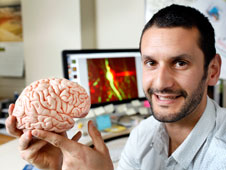Tuesday 2 December 2014 12:56pm

Dr Karl Iremonger
University of Otago physiology researcher Dr Karl Iremonger has won the 2014 Prime Minister's MacDiarmid Emerging Scientist Prize in recognition of his discovery of a new brain cell structure and communication system.
Dr Iremonger's work is setting the stage for more targeted therapies for neurological diseases. He has used cutting-edge technology to help identify brain cells that function differently to what has been previously accepted. His prize is worth $200,000, with $150,000 to be used for further research.
Of the 80 billion brain cells, or neurons, that process information to make our bodies function, Dr Iremonger has concentrated on specific cells that control fertility and reproduction. He says his discovery could ultimately lead to improved contraception and infertility treatments.
University of Otago Vice-Chancellor Professor Harlene Hayne says she is delighted that Dr Iremonger has been awarded the MacDiarmid Emerging Scientist Prize.
“Karl is a prime example of the many up-and-coming academics at Otago who are poised to become the University's—and the country's— research leaders of tomorrow. I congratulate him on his outstanding achievements at such an early stage of his career and look forward to seeing his future contributions.”
Dr Iremonger used laser light microscopes and electrical recordings from specific hormone-releasing neurons that are central to fertility, in a bid to understand how their excitability is regulated. From this, he was able to understand how connections from other brain cells regulate neuron activity and hormone secretion, resulting in normal fertility.
His findings are internationally significant and could throw new light on how other neurons regulate different bodily functions, challenging long-held beliefs about how the brain works.
“When parts of our brain malfunction, the treatments are often poor or ineffective. One of the reasons could be that our thinking about how brain cells function is overly simplistic. My research shows that some brain cells function very differently to what was previously thought.
“It provides a real foundation for other research and opens up possibilities that other neuroscientists may not have thought of,” Dr Iremonger says.
“This means the possibilities are endless. Since the brain controls everything about us—our memories, our emotions, our movements—discovering that various brain cells may process information differently to what we currently think has huge ramifications, specifically in developing treatments for other neurological disorders,” he says.
Dr Iremonger attributes some of his scientific success to his natural curiosity and creativity and says his fascination for the brain drives his energy for discovery.
“It's important to be creative in science. If you're not creative, you're not thinking outside the box and may not come up with new solutions and that's how we achieve new discoveries. People don't often equate science with creativity but a huge part of being a successful scientist is to think creatively.”
Dr Iremonger was Dux at Darfield High School, Canterbury, before completing Bachelor of Physical Education and Bachelor of Science degrees at the University of Otago and a Master of Science and PhD in Neuroscience at the University of Calgary in Canada. Since returning to New Zealand in 2010, he has presented his work numerous times at national and international conferences. He has an outstanding publication record for an early-career scientist.
A researcher and lecturer in the University's Department of Physiology, Dr Iremonger leads a team within Otago's Centre for Neuroendocrinology, which is the largest research cluster of its kind in the Southern Hemisphere. He recently received a prestigious Health Research Council Sir Charles Hercus Fellowship to examine effects of chronic stress on the brain.
Dr Iremonger's prize money will contribute to a state-of-the art research laboratory at Otago, in which he and his team will be applying his world-leading knowledge to discover how the brain controls the body's response to stress.
The 2014 Prime Minister's Science Prizes were presented to winners on Tuesday 2 December at the Museum of New Zealand, Te Papa Tongarewa in Wellington.
Also among the winners was the He Kainga Oranga/Housing and Health Research Programme at the University of Otago, Wellington, which was awarded the 2014 Prime Minister's Science Prize.
Watch clips of Dr Iremonger discussing his research and reaction to winning the Prize.
To find out more about the Prime Minister's Science Prizes.
For more information, contact:
Dr Karl Iremonger
Department of Physiology / Centre for Neuroendocrinology
University of Otago
Tel: 03 479 5210
Email karl.iremonger@otago.ac.nz
A list of Otago experts available for media comment is available elsewhere on this website.
Electronic addresses (including email accounts, instant messaging services, or telephone accounts) published on this page are for the sole purpose of contact with the individuals concerned, in their capacity as officers, employees or students of the University of Otago, or their respective organisation. Publication of any such electronic address is not to be taken as consent to receive unsolicited commercial electronic messages by the address holder.